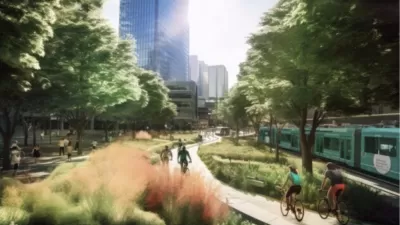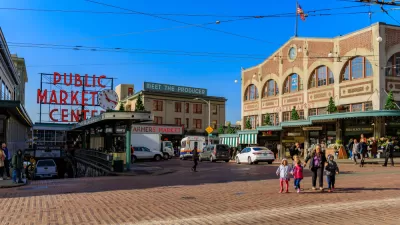Although Seattle's downtown redevelopment may be receiving plaudits, Chuck Wolfe describes efforts underway to rethink land use regulations on a broader level in the city, with jobs in mind.
On the cusp of City Council hearings, Wolfe contrasts recent reports of a downtown revival with an update on the work of a regulatory reform roundtable, which has produced initial recommendations for Council adoption.
The roundtable's goal? Embrace immediate, simplifying measures intended to reduce complexity and increase flexibility, in turn decreasing the costs in time and money of starting and maintaining businesses and building new, more affordable housing as follows:
- Allow Small Commercial Uses in Multifamily Zones and Bring Back the Corner Store
- Concentrate Street-Level Commercial Uses in Core Pedestrian Zones Near Transit and Allow Residential, Live-Work or Commercial Uses in Other Areas Based on Market Demand
- Enhance the Flexibility of Parking Requirements
- Change Environmental Review Thresholds
- Encourage Home Entrepreneurship
- Expand Options for Accessory Dwelling Units and Rental Incomes
- Expand Allowance of Temporary Uses
Wolfe concludes:
"The proposals discussed here to help "make sustainability legal" (a catchy moniker coined by Seattle's Sightline Daily) can help lead the way, but they'll only work if they're implemented in concert with other efforts by city agencies, the city's planning commission and neighborhood stakeholders..."
Thanks to Chuck Wolfe
FULL STORY: The Quest to Make Regulatory Reform Work in Seattle

Study: Maui’s Plan to Convert Vacation Rentals to Long-Term Housing Could Cause Nearly $1 Billion Economic Loss
The plan would reduce visitor accommodation by 25,% resulting in 1,900 jobs lost.

North Texas Transit Leaders Tout Benefits of TOD for Growing Region
At a summit focused on transit-oriented development, policymakers discussed how North Texas’ expanded light rail system can serve as a tool for economic growth.

Why Should We Subsidize Public Transportation?
Many public transit agencies face financial stress due to rising costs, declining fare revenue, and declining subsidies. Transit advocates must provide a strong business case for increasing public transit funding.

How to Make US Trains Faster
Changes to boarding platforms and a switch to electric trains could improve U.S. passenger rail service without the added cost of high-speed rail.

Columbia’s Revitalized ‘Loop’ Is a Hub for Local Entrepreneurs
A focus on small businesses is helping a commercial corridor in Columbia, Missouri thrive.

Invasive Insect Threatens Minnesota’s Ash Forests
The Emerald Ash Borer is a rapidly spreading invasive pest threatening Minnesota’s ash trees, and homeowners are encouraged to plant diverse replacement species, avoid moving ash firewood, and monitor for signs of infestation.
Urban Design for Planners 1: Software Tools
This six-course series explores essential urban design concepts using open source software and equips planners with the tools they need to participate fully in the urban design process.
Planning for Universal Design
Learn the tools for implementing Universal Design in planning regulations.
City of Santa Clarita
Ascent Environmental
Institute for Housing and Urban Development Studies (IHS)
City of Grandview
Harvard GSD Executive Education
Toledo-Lucas County Plan Commissions
Salt Lake City
NYU Wagner Graduate School of Public Service





























